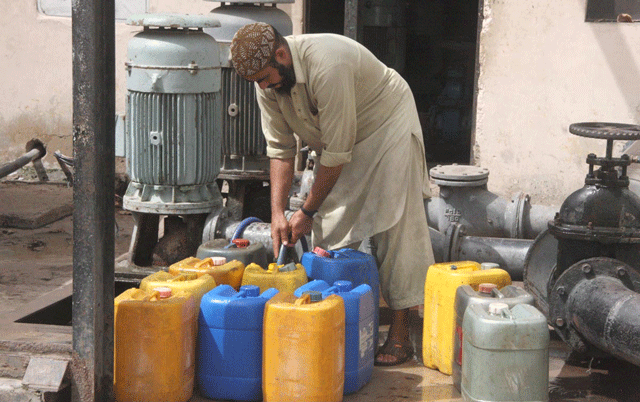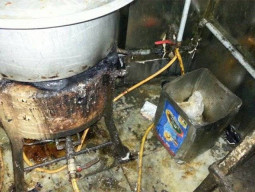
Presiding over a meeting on water shortage in Karachi on Tuesday, the CM expressed concern over inefficiency of the Karachi Water and Sewerage Board (KWSB). He pointed out that water theft and an 80-year-old distribution network were two major contributors to the shortage of water in Karachi.
"Old infrastructure and water being illegally distributed to industrial areas are the main reasons behind water shortage in the city," Shah said, adding that the water shortage in Karachi, however, was not as acute as it was being propagated.
Sources privy to the meeting told The Express Tribune that the CM questioned why politicians, industrialists and other influential persons living in the city were getting water through illegal connections for commercial and other purposes. "The bureaucracy has always misguided former governments and chief ministers, but I am a professional engineer. You cannot misguide me," the CM said, expressing his annoyance over the theft of water. Shah warned the KWSB officials that action would be taken against them if they did not give up appeasing influential and rich people by allowing them illegal water connections.
Protective walls needed around nullahs in Karachi
Referring to the dilapidated water infrastructure, the CM pointed out that the water pipelines were rusted, defective and old due to which water could not be effectively distributed in the city.
The CM calculated the water requirement of Karachi in the meeting. "According to the new census, the population of Karachi is 16 million. As per the water board standard, the water requirement of one person is 50 gallons per day. If the 16 million population is multiplied by 50, the water requirement of the city would be 800 million gallons per day [MGD]," he said, adding that the water crisis in the city could be managed easily.
Shah went on to say that currently, Karachi received 650 MGD, including 550 MGD from Keenjhar and 100 MGD from Hub, and by the end of 2018, the K-IV project would be providing 260 MGD while the city would also receive 65 MGD from another small scheme. "[The addition of water supply] would be 325 MGD. If [it is added to] the available supply of 650 MGD, the available water in the city would be 975 MGD against the requirement of 800 MGD,” Shah maintained. “This water would be enough for another three to four years.”
Local Government Minister Jam Khan Shoro informed the meeting that his department had planned to replace the entire 1,200 kilometre water supply network in Karachi at an estimated cost of Rs200 billion.
Water shortage predicted across Pakistan
After receiving a briefing from the KWSB and local government officials about the replacement of water and sewerage infrastructure in the city, the CM directed the local government minister to share with him a final plan for the replacement of the old water distribution system. "I would suggest that you collect area-wise data of the water supply lines and start replacing the oldest ones in the first phase," Shah said. The CM added that he would ensure that the project received the funds it required.
The meeting was attended by provincial ministers Manzoor Wassan, Dr Sikandar Mandhro, Shoro and Fayaz Butt, along with Chief Secretary Rizwan Memon, Advocate-General Zamir Ghumro, Planning and Development Board Chairperson Mohammad Waseem, Principal Secretary to CM Sohail Rajput, KWSB managing director, World Bank representatives and provincial secretaries.
50 MW power plant
Shoro informed the CM that the Hyderabad Electric Supply Company (Hesco) had demanded the KWSB to pay Rs6 billion for the supply of 50MW electricity to the pumping stations of K-IV project at Keenjhar Lake. To this Shah said, "Instead of paying Rs6 billion for 50MW power and transmission line, why the water board should not install its own LNG-based or wind power plant of 50 MW".
Suggesting KWSB to install its own power plant for K-IV project, Shah directed Shoro to utilise Rs2 billion as equity and seek a private partner for the remaining funds for the construction of the power plant and transmission line. "It must be installed within one year," the CM said. He assigned Energy Secretary Agha Wasif the task to work out the plan for the power plant with the local government minister and the KWSB MD.
Pakistan ‘may run out of water by 2025’ if steps not taken on time
The meeting was also informed that three kinds of wastewater - originating from municipal, hospital and industrial sources - were being released into Lyari and Malir rivers.
The CM also directed Public Health Engineering Secretary Tamizuddin Khero to work out a detailed plan for the construction of drainage system for major villages of 22 districts. "The drainage system should be designed as per population figures of the new census," he said.
Shah also issued directives to divisional commissioners to provide him water testing reports of their respective areas. "I want you [divisional commissioners] to take necessary measures to ensure that municipal wastewater is released into drains instead of rivers," he said, adding that this practice must be maintained till the installation of waste treatment plants in every district headquarters in the first phase and taluka headquarters in the second phase.
The chief minister said he would hold a meeting on December 28 to review the progress on his directives to improve water and sanitation situation in the province.

1729161093-0/liam-(4)1729161093-0-165x106.webp)


1732603002-0/lamar-(4)1732603002-0-165x106.webp)












COMMENTS (2)
Comments are moderated and generally will be posted if they are on-topic and not abusive.
For more information, please see our Comments FAQ